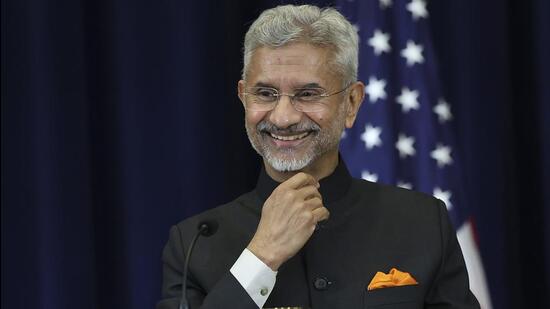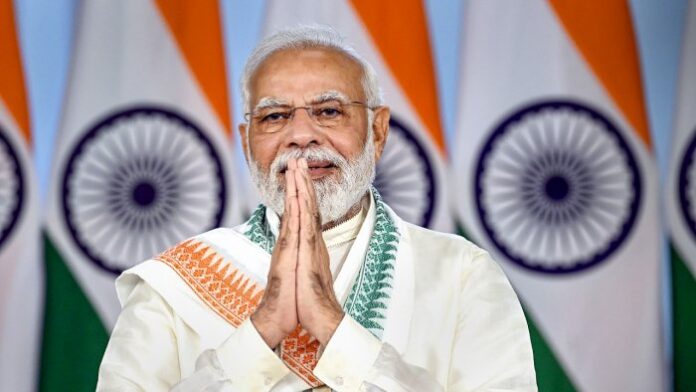Prime Minister Narendra Modi delivered a compelling address at a business roundtable in Sydney, urging prominent Australian companies to seize investment opportunities in India. During his three-day visit to Australia, Modi emphasized his government’s commitment to economic reforms, ease of doing business, and overall economic growth.
 The roundtable included CEOs representing diverse sectors such as steel, banking, energy, mining, and IT, as well as vice-chancellors from leading Australian universities. Modi specifically highlighted key areas for potential investments, including infrastructure, fintech, telecommunications, semiconductors, and renewable energy. He also mentioned digital infrastructure, space technology, pharmaceuticals, healthcare, mining, textiles, agriculture, and food processing as lucrative sectors for collaboration.
The roundtable included CEOs representing diverse sectors such as steel, banking, energy, mining, and IT, as well as vice-chancellors from leading Australian universities. Modi specifically highlighted key areas for potential investments, including infrastructure, fintech, telecommunications, semiconductors, and renewable energy. He also mentioned digital infrastructure, space technology, pharmaceuticals, healthcare, mining, textiles, agriculture, and food processing as lucrative sectors for collaboration.
Modi drew attention to several initiatives that have transformed the Indian business landscape. These initiatives encompass Mission Gati Shakti, which focuses on integrated infrastructure connectivity projects, the Jan Dhan-Aadhaar-Mobile trinity, the National Education Policy, Hydrogen Mission 2050, the production-linked incentive (PLI) scheme, and the liberalization of space and geospatial sectors for private investments. He also emphasized the new policy for manufacturing medical devices.
 Encouraging Australian CEOs to establish mutually beneficial partnerships with Indian counterparts, Modi stressed the potential for comprehensive economic cooperation between the two countries. The prime minister’s call to explore investment opportunities was made following productive bilateral talks with Australian Prime Minister Anthony Albanese, during which they reaffirmed their commitment to swiftly concluding negotiations on a comprehensive economic cooperation agreement.
Encouraging Australian CEOs to establish mutually beneficial partnerships with Indian counterparts, Modi stressed the potential for comprehensive economic cooperation between the two countries. The prime minister’s call to explore investment opportunities was made following productive bilateral talks with Australian Prime Minister Anthony Albanese, during which they reaffirmed their commitment to swiftly concluding negotiations on a comprehensive economic cooperation agreement.
PM Modi Highlights Economic Reforms and Invites Australian CEOs to Explore Investment Opportunities in India
Among the prominent CEOs who participated in the roundtable were representatives from Rio Tinto, National Australia Bank, Wisetech, and Australian Industry Bank. Modi also met with Australia’s Governor-General David Hurley at Admiralty House, discussing strategies to strengthen the bilateral partnership. The prime minister acknowledged the significant contributions made by the Indian diaspora in Australia, highlighting their pivotal role in fostering closer ties between the two nations.
During a separate meeting with Australia’s Leader of Opposition Peter Dutton, Modi expressed appreciation for the robust bipartisan support underpinning the India-Australia comprehensive strategic partnership. The discussions encompassed people-to-people connections and regional developments.
External Affairs Minister S. Jaishankar, a part of the prime minister’s delegation, held a separate meeting with his Australian counterpart Penny Wong. Both ministers acknowledged the growing collaboration between India and Australia at regional and global levels, emphasizing their shared interest in a peaceful, stable, and prosperous region.
Wong reiterated the significance of the India-Australia relationship and the alignment of strategic and economic interests. She commended the discussions held with Jaishankar, focusing on expanding cooperation to achieve their desired regional goals. Wong also met with National Security Adviser Ajit Doval, highlighting Australia and India’s shared commitment to regional stability and respect for sovereignty.
Forging Stronger Ties: PM Modi Champions Economic Reforms and Extends a Warm Invitation to Australian CEOs for investment in India
The deepening partnership between India and Australia was celebrated during the roundtable, with Wong stating that the relationship continues to strengthen and that Australia considers India one of its most important partners. The strategic alignment, shared interests, and growing economic ties between the two nations were underscored as key drivers of their robust bilateral relationship.
Modi’s address and subsequent meetings showcased the immense potential for collaboration between India and Australia, transcending bilateral engagement to contribute to regional and global stability. Both countries expressed their commitment to shaping a secure region that upholds the principles of sovereignty and peaceful coexistence.
As the economic relationship between India and Australia flourishes, the foundation for a long-lasting partnership is being solidified, with mutual interests and strategic objectives guiding their collective efforts towards a investment of prosperous future.
 Prime Minister Narendra Modi took center stage at a business roundtable held in Sydney, where he delivered a powerful address inviting top Australian CEOs to explore and capitalize on the vast investment opportunities in India. During his highly anticipated three-day visit to Australia, Modi emphasized his government’s unwavering commitment to implementing economic reforms and fostering an environment conducive investment to business growth and development.
Prime Minister Narendra Modi took center stage at a business roundtable held in Sydney, where he delivered a powerful address inviting top Australian CEOs to explore and capitalize on the vast investment opportunities in India. During his highly anticipated three-day visit to Australia, Modi emphasized his government’s unwavering commitment to implementing economic reforms and fostering an environment conducive investment to business growth and development.
In attendance were CEOs representing a wide array of sectors, including steel, banking, energy, mining, and information technology. Notably, distinguished vice-chancellors from leading Australian universities were also present at the roundtable, signaling the importance of collaboration between academia and industry. Modi’s address focused on highlighting key areas of potential investment in India, spanning crucial sectors such as infrastructure, fintech, telecommunications, semiconductors, and renewable energy. Additionally, he underscored the significant opportunities in digital infrastructure, space technology, pharmaceuticals, healthcare, mining, textiles, agriculture, and food processing.
During his speech, the Indian Prime Minister shed light on a series of transformative initiatives that have propelled India’s business landscape forward. These initiatives encompassed a wide range of programs, including Mission Gati Shakti, which seeks to integrate infrastructure connectivity projects; the Jan Dhan-Aadhaar-Mobile trinity, which has revolutionized financial inclusion; the National Education Policy, aimed at revamping the education system; the ambitious Hydrogen Mission 2050; the production-linked incentive (PLI) scheme, designed to boost manufacturing; and the opening up of the space and geospatial sectors to private investment. Additionally, Modi emphasized the recently unveiled policy for the manufacturing of medical devices, which holds immense potential for growth and innovation.
In his impassioned plea to Australian CEOs, Modi encouraged them to forge mutually beneficial partnerships with Indian counterparts, leveraging the strengths and expertise of both nations. This call for collaboration followed fruitful bilateral talks between Modi and Australian Prime Minister Anthony Albanese, during which they reaffirmed their shared commitment to expediting negotiations on a comprehensive economic cooperation agreement. By fostering stronger ties and enhancing cooperation, the leaders aimed to unleash the full potential of the India-Australia economic relationship.
Among the esteemed CEOs present at the roundtable were representatives from renowned companies such as Rio Tinto, National Australia Bank, Wisetech, and Australian Industry Bank. Their participation highlighted the significant interest and eagerness to explore the promising investment opportunities in India. Furthermore, Modi’s engagements extended beyond the business roundtable, as he also met with Australia’s Governor-General David Hurley at Admiralty House. During their meeting, they discussed strategies and initiatives aimed at bolstering the bilateral partnership. Modi took the opportunity to acknowledge the valuable contributions made by the Indian diaspora residing in Australia, recognizing their role in fostering closer ties and fostering cultural exchanges between the two nations.

